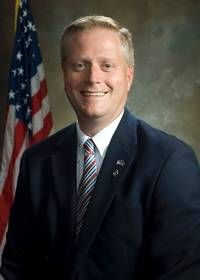Click here to subscribe today or Login.
WILKES-BARRE — U.S. Rep. Dan Meuser this week introduced legislation that would increase accountability and transparency for the federal budget process by requiring Congress to account for interest costs that are accrued through the servicing of debt.
The Budgetary Accuracy in Scoring Interest Costs Act of 2019 updates Congressional Budget Office and Joint Committee on Taxation cost scoring requirements to include debt costs created by legislative proposals.
“Publicly held debt is at a staggering 78 percent of the United States’ GDP — the Basic ACT of 2019 will bring greater integrity and transparency to the federal budget process,” said Meuser, R-Dallas. “It is vital to the success of our economy that we see the full and true cost of any new proposal. Only then can we begin to move away from years of misguided policies.”
House Budget Committee Ranking Member Steve Womack, R-Ariz., commended Meuser for introducing the legislation.
“The American people deserve full transparency in how their tax dollars are spent,” said Womack, an original co-sponsor of the bill. “Due to inaction in Washington for years, interest on the debt will soon be the size of the defense budget. Requiring a more accurate accounting of managing our debt will help drive toward a long-term fiscally responsible solution.”
The Congressional Budget Act of 1974 requires that the CBO and JCT provide budgetary and revenue scores for legislation to be considered by Congress.
Given the nation’s current annual deficit, Meuser said all new legislative proposals that include added costs are debt financed.
”Without this new reporting requirement, the full cost of any proposal can’t be fully known,” Meuser said.
CBO estimates that annual debt interest payments, which stand at $382 billion in 2019, will be $921 billion by 2029.
Shapiro announces relief for those
targeted by online payday scheme
Pennsylvania Attorney General Josh Shapiro last week announced a settlement with Think Finance, a national online payday lender, and an associated private equity firm for allegedly engineering a $133 million illegal online payday loan scheme that targeted as many as 80,000 Pennsylvania consumers.
The settlement will void all remaining balances on the illegal loans.
Pennsylvania is one of the leading creditors that negotiated this comprehensive settlement with Think Finance as part of its bankruptcy plan, which is pending approval before the Bankruptcy Court and subsequent approval by the U.S. Eastern District Court of Pennsylvania.
In late 2014, the Pennsylvania Office of Attorney General sued Think Finance Inc. and Chicago-based private equity firm Victory Park Capital Advisors, LLC, and various affiliated entities. The suit alleged that between 2011-2014, three websites operated by Think Finance — Plain Green Loans, Great Plains Lending and Mobiloans — allowed borrowers to sign up for loans and lines of credit while charging effective interest rates as high as 448 percent. Payday loans, which typically charge interest rates higher than 200 or 300 percent, are illegal in Pennsylvania.
The suit also alleged that the websites attempted to shield themselves from state and federal laws by operating under the guise of Native American tribes and the First Bank of Delaware, a federally chartered bank, with a loan product called “ThinkCash.”
Shapiro alleged that these actions were in violation of several Pennsylvania laws, including the Pennsylvania Unfair Trade Practices and Consumer Protection Law, the Pennsylvania Corrupt Organizations Act, the Pennsylvania Fair Credit Extension Uniformity Act, and the federal Consumer Financial Protection Act of 2010. Victory Park Capital was sued under the Corrupt Organizations Act only.
“This is a model of how aggressive enforcement by one state can lend itself to nationwide relief for consumers,” Shapiro said. “The settlement will provide relief to approximately 80,000 Pennsylvanians who fell victim to the $133 million payday loan scheme engineered by Think Finance and its affiliates, as well as to consumers across the country who were also affected. Our Bureau of Consumer Protection will hold accountable anyone who tries to exploit Pennsylvania consumers by charging illegal interest rates.”
In addition to voiding all remaining balances on the illegal loans, the settlement will enable borrowers who repaid more than the loan principal and the lawful interest rate of 6 percent to share proportionately in a multi-million-dollar fund created by the settlement. Consumers will receive a check in the mail and will not have to do anything to claim their refunds. The defendants will also request that the credit bureaus delete any credit reporting on the loans.
Rep. Keller votes to
stop abusive robo calls
The U.S. House of Representatives last week voted to pass legislation co-sponsored by U.S. Rep. Fred Keller to stop abusive robocalling.
“Robocalls are annoying, abusive, and quite frankly out of control,” said Keller, R-Middleburg. “This year alone, the average person has already received 89 robocalls. I’m glad to have worked to pass the Stopping Bad Robocalls Act and hopefully end the robocall epidemic in this country once and for all.”
Last year, Americans received nearly 50 billion robocalls. While these calls are annoying, they also heighten the chance of being scammed or defrauded. Some studies estimate that nearly half of all calls this year will be scam calls.
H.R. 3375, the Stopping Bad Robocalls Act:
• Requires the Federal Communications Commission (FCC) to adopt critical consumer protections and to report to Congress on its progress against illegal robocallers.
• Gives the FCC up to four years to catch illegal callers and streamlines the FCC’s ability to quickly fine first-time offenders.
• Supports the rapid implementation of new technologies to make sure that every call is authenticated, and illegal calls are blocked.
• Allows the blocking of illegal robocalls in a reasonable manner by providers without an extra line-item charge to consumers.
• Establishes a Hospital Robocall Working Group to shield our health care system from illegal robocalls.
Wolf announces plan
to improve customer service
Gov. Tom Wolf last week announced the launch of an initiative that will improve customer service by making it easier for Pennsylvanians to connect with state agencies and services, while protecting their privacy and personal information.
“I learned in the private sector the most important part of business is trust and excellent customer service,” Wolf said. “Pennsylvanians deserve the same from their state government. I am launching this groundbreaking new initiative that will transform how the state provides services to make it as easy and convenient for people as possible, whether it is online, on the phone or in-person.
“We’ll use new ideas, secure technologies, and feedback to improve the overall experience of Pennsylvanians – our customers – across state agencies. With each improvement, we will always respect each person’s privacy and ensure their data is strictly protected.”
The Customer Service Transformation consists of multiple long-term projects that will be accomplished over several years. The projects include:
• One secure online account — One challenge for Pennsylvanians is knowing which department provides a service they need. The initiative will seek to create a single online location and log-in for Pennsylvanians to access all commonwealth services.
Pennsylvanians will access a growing number of online services using a single, secure account known as Keystone Login. The online profile is already offered by the Department of Community and Economic Development, Department of General Services, Pennsylvania Commission on Crime and Delinquency and Office of Administration.
• One phone number — Many people prefer to speak to someone over the phone or in-person. Here again, knowing which department provides the service is a potential barrier.
Similar to “311” systems in many cities, the Customer Service Transformation initiative will establish a single phone number to connect people to services. Existing phone numbers will continue to be available.
The new central phone number is expected to be announced in the coming months. It will be rolled out to agency services in phases.
• Continuously improving customer satisfaction — The initiative will also provide new opportunities for the public to provide feedback about the service they receive. This data will be used to identify opportunities to improve and innovate, as well as be published online.












